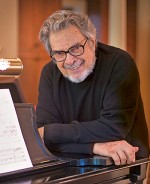Title
In November 1944, a rather gangly 16-year-old pianist named Leon Fleisher ascended the stage at Carnegie Hall and made his debut with the New York Philharmonic. The piece he played was one of the most substantive ones in the repertory: the Brahms Piano Concerto No. 1 in D minor. Fleisher was hailed by The New York Times as one of the most remarkably gifted pianists of his generation—an accolade which in the coming years would prove to be no overstatement. Almost seven decades later, on February 24, Fleisher will give a master class on, and then conduct, the same piece with the Juilliard Orchestra and a yet-to-be-determined soloist.
Body
Brahms’s First Piano Concerto is a bold, sprawling work filled with enormous strife, yet great strength in the face of it. Written when Brahms was 25, the work—which started out as sketches for a symphony, then morphed into a two-piano sonata before taking on its final form as a concerto—was a failure with the audiences of the time. Fleisher described some of his thoughts about the piece in a recent phone interview with The Journal. “Everybody has those moments when they would like to shout out, ‘Stop the world, I want to get off,’ he said, emphasizing the universality of the defiant yet angst-ridden feelings conveyed in the work. “I think that Brahms had a kind of courage in that first concerto that he never really achieved again. I can’t help but feel that the very cool reception it got at its world premiere might have affected him, whether consciously or subconsciously.”
Fleisher began learning the piece when he was 12 years old, and even from that young age he described the experience of being introduced to it as “soul-shattering,” saying, “those kinds of experiences remain with you for the whole of your life.” Indeed, the concerto punctuated some of the most meaningful moments of his career. He became the first American to win the Queen Elisabeth of Belgium Competition with it in 1952, and his 1956 recording of it with George Szell conducting the Cleveland Orchestra is perhaps his best-known recording. In his 2010 memoir, My Nine Lives, Fleisher refers to the piece as his “lifelong companion.”
Tragically, it was a piece which he was unable to play for nearly four decades.
In 1965, Fleisher began to develop symptoms of what would later be diagnosed as focal dystonia, a rare and incurable disease that causes involuntary cramping of the muscles. In his case, he had trouble controlling his right pinky and ring finger. As the symptoms got worse, it prevented Fleisher from being able to perform any two-hand repertoire. It was not until the 1990s that Fleisher got a correct diagnosis and found a treatment that alleviated the symptoms—a series of Botox injections caused his arm muscles to release. Little by little, his right hand has recovered to the point where it is once again nearly fully functional, and in 2004, he released an album comprised entirely of traditional two-handed piano repertoire, the aptly titled Two Hands.
Fleisher now looks back on this period of his life with a surprisingly positive attitude, telling The Journal that dystonia “opened up a whole realm of possibilities while seeming to cut off a very important part of my life.” When only his left hand was functioning up to capacity, Fleisher continued concertizing by mastering the relatively small repertory of piano works written for the left hand alone. It was during this time that Fleisher also began conducting, first co-founding and conducting the Theater Chamber Players in Baltimore, and later accepting conducting engagements with the Baltimore and Annapolis symphonies. “I’m sure that had nothing happened to my hand, I would have gone on as a two-handed pianist, and I doubt if I would have had all those extraordinarily satisfying and gratifying experiences as a conductor or even investigating the left-hand literature,” which, he noted, “is not insignificant.”
Fleisher also devoted more and more time to teaching. While he teaches, he said, “I remember those times of doubt and frustration and the feeling of discontent when unable to find a satisfactory solution to a musical problem, and I think that’s always an adventure. I love to share that adventure with my students and to share those moments of revelation.”
No doubt those aha moments will abound for audience and performers during Fleisher’s Juilliard master class and performance. And despite spending a lifetime with the concerto, Fleisher, he reports that he never grows weary of it. “One of the great things about music—probably one of the reasons one chooses a field like music—is that it itself is ever evolving and being among the great creations of the human spirit and the human mind. There are certain parts that remain forever elusive, so you can never make the definitive performance. It’s always changing, it’s always evolving, and you always have new things to find.”





